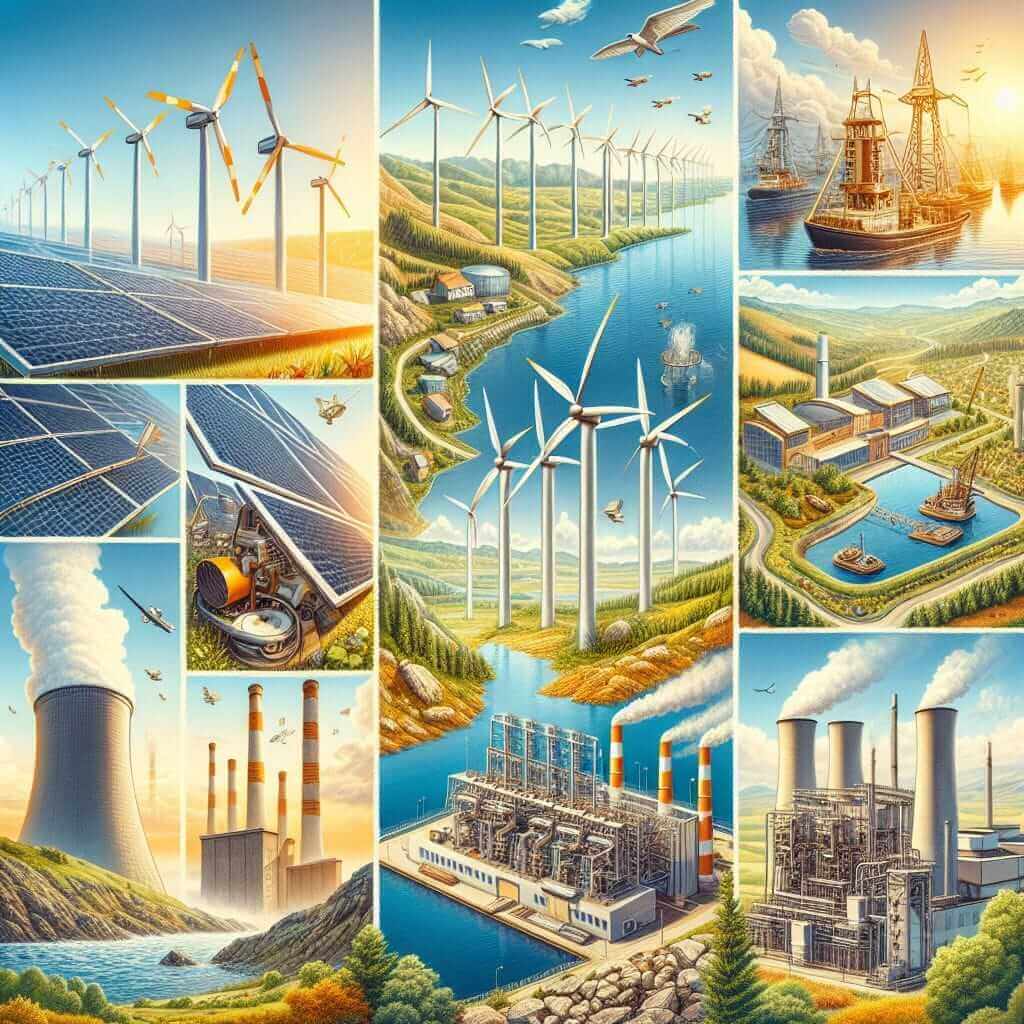The IELTS Reading test assesses a wide range of reading skills, including your ability to understand specific details, identify the writer’s opinions, and grasp implied meanings. Over the years, the topic of renewable energy has gained significant relevance. From governmental policies to global warming concerns, it’s a hotbed for academic and real-world discussions. Given its recurrent pervasiveness, it is highly advisable to get acquainted with this subject matter for future IELTS exams.
Main Content
IELTS Reading Practice Test on “The Benefits and Challenges of Renewable Energy Adoption”
Passage:
Renewable energy is a pivotal area of innovation that has garnered substantial attention globally. These energy sources, derived from natural processes that are replenished constantly, include solar, wind, hydro, geothermal, and biomass. As the globe shifts towards a sustainable future, the adoption of renewable energy presents both advantages and challenges.
The primary benefit of renewable energy is its contribution to environmental sustainability. Renewable resources produce no greenhouse gases or harmful emissions during energy generation, thereby significantly reducing the carbon footprint. This contrasts starkly with fossil fuels, which release large quantities of carbon dioxide and other pollutants. Moreover, harnessing renewable energy can reduce dependence on finite resources, ensuring energy security and stability for the future.
Another notable advantage is the potential economic benefits. The renewable energy sector has generated millions of jobs worldwide, from manufacturing solar panels to installing wind turbines. Furthermore, the decentralization of energy production allows for greater resilience in tackling energy shortages and reduces the risks associated with geopolitical tensions over fossil fuel supplies.

Despite these benefits, the adoption of renewable energy also presents significant challenges. One of the primary obstacles is the high initial cost of infrastructure development. Building wind farms, solar parks, and other renewable energy installations require considerable investment. Moreover, these technologies often demand substantial land and can sometimes lead to habitat disruption.
Intermittency is another challenge. Solar and wind energy production can be unpredictable and dependent on weather conditions. Energy storage solutions, such as batteries, are essential to mitigate this issue, but they currently remain costly and resource-intensive.
Socio-political factors also play a crucial role. Policies and regulations must adapt to facilitate the transition from fossil fuels to renewable energy. Resistance from established fossil fuel industries and varying levels of government support can hinder progress.
In summary, while the adoption of renewable energy stands as a promising solution for sustainable development, it requires overcoming financial, technological, and socio-political hurdles. Addressing these challenges will be crucial to reaping the full benefits of a renewable energy future.
Questions
Multiple Choice
- What is the main environmental benefit of renewable energy as discussed in the passage?
- A) It is less expensive than fossil fuels.
- B) It produces no greenhouse gases or harmful emissions.
- C) It is abundant and easily accessible.
- D) It can be generated without any infrastructure.
Identifying Information (True/False/Not Given)
-
True/False/Not Given: Renewable energy sources can completely eliminate the need for fossil fuels.
-
True/False/Not Given: Job creation in the renewable energy sector is limited compared to fossil fuels.
Matching Headings
-
Match each paragraph with the appropriate heading:
-
Paragraph 1:
- i) Types of Renewable Energy
- ii) The Economic Benefits of Renewable Energy
- iii) Introduction to Renewable Energy
-
Paragraph 2:
- i) Environmental Impact of Renewable vs. Fossil Fuels
- ii) Financial Considerations
- iii) Job Market in the Renewable Sector
-
Paragraph 3:
- i) Land Utilization for Energy Production
- ii) Financial and Technological Challenges
- iii) Government Policies and Renewable Energy
-
Answers and Explanations
Multiple Choice
- B) It produces no greenhouse gases or harmful emissions.
- Explanation: The main environmental benefit highlighted in the passage is the lack of greenhouse gases or harmful emissions during energy generation.
Identifying Information (True/False/Not Given)
-
False.
- Explanation: While renewable energy reduces dependency on fossil fuels, the passage does not state that it completely eliminates their need.
-
Not Given.
- Explanation: The passage mentions job creation in the renewable energy sector but does not compare it directly to job creation in fossil fuels.
Matching Headings
- Answers:
- Paragraph 1 = iii) Introduction to Renewable Energy
- Paragraph 2 = i) Environmental Impact of Renewable vs. Fossil Fuels
- Paragraph 3 = ii) Financial and Technological Challenges
Common Mistakes
- Overlooking Key Details: Always look for specific information that directly answers the questions.
- Misinterpreting Statements: Pay close attention to what is explicitly stated and what is implied.
- Ignoring the Context: Understand the context in which information is presented to better match it with headings or answer True/False/Not Given questions.
Vocabulary
- Sustainability (noun) /səˌsteɪ.nəˈbɪl.ə.ti/: the ability to be maintained at a certain rate or level
- Emissions (noun) /ɪˈmɪʃ.ənz/: substances discharged into the air, often pollutants
- Intermittency (noun) /ˌɪn.tərˈmɪt.ən.si/: occurring at irregular intervals; not continuous or steady
- Decentralization (noun) /diˌsɛn.trə.ləˈzeɪ.ʃən/: the distribution of functions and powers from a central authority
- Geopolitical (adjective) /ˌdʒiː.oʊ.pəˈlɪt.ɪ.kəl/: related to politics, especially international relations, as influenced by geographical factors
Grammar Points
-
Passive Voice: Used to emphasize the action rather than who is performing the action.
- Example: “The renewable energy sector has generated millions of jobs worldwide.”
-
Relative Clauses: Provides additional information about a noun without starting a new sentence.
- Example: “These energy sources, derived from natural processes that are replenished constantly, include solar, wind, hydro, geothermal, and biomass.”
Conclusion and Tips
To excel in the IELTS Reading test, practice regularly with diverse passages to familiarize yourself with different topics. Learn to identify keywords quickly and understand their context. Always review your answers and understand your mistakes to improve. For further practice on renewable energy topics, you might want to check out related articles such as Challenges of Achieving Global Renewable Energy Adoption and The Effects of Renewable Energy Adoption on Traditional Energy Sectors.
Good luck with your preparation, and remember, practice is the key to achieving a high score in the IELTS Reading test.